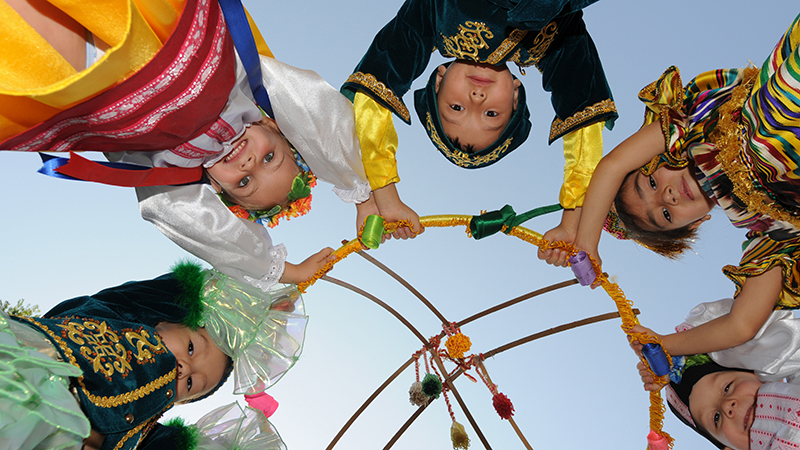Qonaqsiz ev susuz dayirman kimidir
“A house without a guest is like a mill without water”
Azerbaijan is one of the cradles of humanity and an example of peaceful coexistence between people of different nationalities and religions. Because of its extraordinary ethno-linguistic and religious richness, Azerbaijan is internationally recognized as one of the most heterogeneous social realities in the world. Azerbaijan belongs to the wider Caucasus region, one of the oldest and most culturally complex areas of the world. It is located between two totally different realities: the East and the Eurasian steppes inhabited by nomadic tribes.
The “frontier” nature of this region has historically favored the passage of different peoples, and each of them has left to the territory its own ethical and religious inheritance. For centuries a multitude of religions have coexisted in the same territory, from the Zoroastrians to the Albanians to Muslims (mostly Shiites), who today represent the majority of believers in Azerbaijan. Religion in the area survived over time many attempts of eradication, such as the one promoted by the Soviet government which tried to fight all religions and to promote a gradual de-Islamization of the population which, during its domain, was almost brought complete.
Besides the Muslims, which represent the 96.9% (predominantly Shia) of the population [1], a large Chrisitian community as well as a large Jewish community are both living peacefully and have a long history in the region. Azerbaijan has historically hosted one of the world’s earliest Christian communities. This community has always represented an important part of the culture and society of Azerbaijan and even today it represents the most vibrant religious reality together with the Jews one. The Jewish community also has a long heritage in Azerbaijan, dating back more than 2,000 years. Today, it numbers about 30,000 devotes. [2]
The above mentioned religions continue to live together in the name of age-old respect and tolerance of the people who strongly believe in peaceful coexistence. Time after time, Azerbaijan became synonymous of acceptance and tolerance, trust and confidence between people of different faiths who enjoy peaceful coexistence and live with mutual respect for each other. For what has been just said it is not surprising that Azerbaijan is one of the few Muslim countries that maintains both economic and religious relations with Israel. [3]
The strength of Azerbaijan was to understand that multiculturalism can be adopted as a public policy and to believe that each cultural system has its own originality, which attests to the ingenuity and creativity of humans. Because of that, the government of Azerbaijan daily promotes the absolute right of all people to preserve their own identities. It seems to be clear that multiculturalism in Azerbaijan is something different and exceptional. The government truly understood how to promote religious harmony in the society and the meaning of coexistence: to live together implies “mutual respect” rather than just “tolerance” which means acceptance but not necessarily respect for others.
Religious peaceful coexistence is also guaranteed at political level. The Constitution of Azerbaijan, one of the most advanced of the entire Islamic world, clearly separates religion from the state and all religions can be openly professed. Clauses 1-2 of Article 18 states that in Azerbaijan religion is separated from the state, all religions are equal, spreading and propaganda of religion, humiliating people’s dignity and contradicting the principles of humanism are prohibited. According to Article 48 of the Constitution, everyone has the right to define his/her attitude to religion, to profess, individually or together with others, any religion or to profess no religion, to express and spread one’s beliefs concerning religion.[4]
Unlike most other Islamic countries, here atheists are accepted, while they are generally placed on a lower rung of the infidels, together with Jews and Christians, elsewhere [5]. Because of its nature of crossroad of religions and civilizations Baku was soon coceived as the best place for the promotion of intercultural dialogue. With this intention, over the last decade, the government has organized numerous initiatives such as the one known as “Baku Process” for the promotion of intercultural dialogue. The idea behind that initiative was to contribute to facilitate mutual understanding between people belonging to different cultures so that to hold together the community.
Through these initiatives the government of Azerbaijan daily pursues the dream of the fully achievement of peace in the world, which is continously hampered by clashes ignited by negative ideologies and intolerance. “The Baku Process” was organized in partnership with the Coucil of Europe and placed emphasis on the importance of dialogue among cultures and civilizations as an essential reality of today’s world. Bringing together ministers of culture from the Coucil of Europe and a number of Muslim countries will enable another major step in the development of dialogue and mutual understanding in the globalized world. [6]
The Baku Process was the occasion for the government to highlight the vital role of cultural policy and to confirm its own intention to do more and more to promote peace and harmony with each others and with other nation states. The peaceful coexistence of a number of nations and religious confessions in Azerbaijan has also prevented the success of efforts put in place by mostly Armenians propagandists who have tried unsuccessfully to depict the conflict with Azerbaijan as a secular one between Christians and Muslims. The propagandists purposefully present it as a conflict “between Christian Armenia and Muslim Azerbaijan,” trying to take advantage of the Islamophobia spread around the world.
This attempt failed because Azerbaijan is internationally recognized as a secular republic and is globally celebrated as a successful model for multi-faith and multicultural engagement. It is also an international champion, alongside the U.S. and other allies, in the fight against terrorism and extremism. Over 30,000 Armenian Christians live peacefully in Baku, which boasts a grand Armenian Church, completely renovated and perfectly preserved by the Azerbaijan’s government [7]. To promote dialogue between different cultures and religions, the government strongly trusts the importance of education, not only as a usefull sector to pursue economic diversification but even as the best channel to spread knowledge about the other, thus reducing fear of what is unknown.
The government of Azerbaijan has promoted tolerance from the earliest time and has always rejected any form of radicalism or extremism. The government daily tries to do its best to make the world a better place encouraging peace between people of different nationalities and religions. In a world of globalization and inequality, which is simultaneously bringing people closer together and widening the divisions between them, Azerbaijan seems ready to offer tools to listen to the voice of people who everywhere today demand inclusiveness, prosperity and peace. Even if its efforts will never be enough, the government continues to promote social inclusivity, giving the world a demonstration of democracy and liberalism. Democracy is a process which needs time to be complete but Azerbaijan is on the right track.
Giorgia Pilar Giorgi
© RIPRODUZIONE RISERVATA
1 https://www.cia.gov/library/publications/the-world-factbook/geos/aj.html.
2 “Agree to differ”, UNESCO Publishing, 11 mag 2015 , p.35.
3 BENSI G.,“Le religioni dell’Azerbaigian”, 2012.
4 http://azerbaijan.az/portal/General/Constitution/doc/constitution_e.pdf
5 BENSI G., “Le religioni dell’Azerbaigian”, 2012.
6 “Agree to differ”, UNESCO Publishing, 11 mag 2015.
7 NASIMI A., “The Armenia-Azerbaijan Conflict: The Unfortunate Role Of Propaganda”, 2016.



















